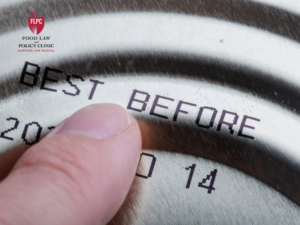Written by Dominique Trudelle, current student in the Food Law and Policy Clinic.

As a Continuing Clinical student in the Food Law and Policy Clinic this semester, I spent two days at the North American Workshop on Food Waste Reduction and Recovery in Toronto, Canada. Since starting the clinic in January, I have been learning about and working on FLPC’s food waste and food recovery initiatives. Specifically, I helped to finalize a recent report produced in partnership with NRDC, Don’t Waste, Donate: Enhancing Food Donation through Federal Policy, detailing how the federal government can better align federal laws and policies with the goal of increasing donations of safe, surplus food to those in need. Through this work, I have learned about improving liability protections and tax incentives for food donation, as well as ways to support innovative food recovery models. At the Workshop, interacting with other organizations highlighted how each approaches tracking, reducing, and recovering food waste.
The Workshop brought together experts working in government, industry, business and academia from Canada, the United States, and Mexico to discuss opportunities to reduce food waste across the food supply chain in each country. The Workshop included a mix of short presentations about topics ranging from donation of surplus foods by retailers, tracking food waste, and liability protections for food donations in the U.S. by retailers, innovative food recovery organizations, and academics. These presentations were followed by roundtable discussions. Having focused primarily on food recovery, I appreciated the opportunity to discuss food waste reduction with others whose perspective and strategies differ from those I have focused on during my clinic.
It was also exciting to hear about the ongoing work of many of the participants. For example, one doctorate student described spending much of her time driving to various farms to meet with growers in order to better understand how much produce is tilled under. She also explained the difficulties that come along with her work, which helped me better understand why there is limited data regarding food that goes to waste on farms. I also listened to participants discuss their experience working with hotels and restaurants, and their strategies for spreading the message that throwing away safe, wholesome food is akin to throwing away money. These presentations showed me another source of food waste that I had not previously considered and pushed me to think about how to frame a particular message so that it resonates with the intended audience. Ultimately, conversations with Workshop participants left me with a better understanding of the goals of various stakeholders in the food waste reduction and recovery landscape and a better sense of the clinic’s role among these groups.
In addition, organizers presented a working draft of the Commission for Environmental Cooperation’s (CEC) report, Characterization and Management of Food Waste in North America, in order to solicit feedback from attendees. Organizers asked participants to join one of about a dozen groups, each discussing a particular subject and drafting a recommendation to be included in the report. Along with representatives from anti-hunger organizations, food banks, other food recovery organizations, and California, I joined the roundtable discussion about increasing donations of surplus food. Although the discussion was short, it was interesting to see how each of us had different suggestions for arriving at the same goal. While my suggestions aligned with those presented in Don’t Waste, Donate, others much closer to the ground could explain in detail the barriers they regularly face and policy changes they wished to see. Better understanding the challenges food recovery organizations face helped me contextualize the clinic’s work on this subject and recognize that it is important to continue to support their work by pushing for policy changes the state and federal levels.
I am grateful to for the opportunity to have participated in the Workshop’s conversations. Listening and learning about the work of various participants helped me connect with a broader audience as we continue tackle food waste.


Health Law & Policy, Commentary
Cuts to the Federal Workforce and Medicaid: What’s Happening and What Can Advocates Do? – Health Care in Motion
March 12, 2025